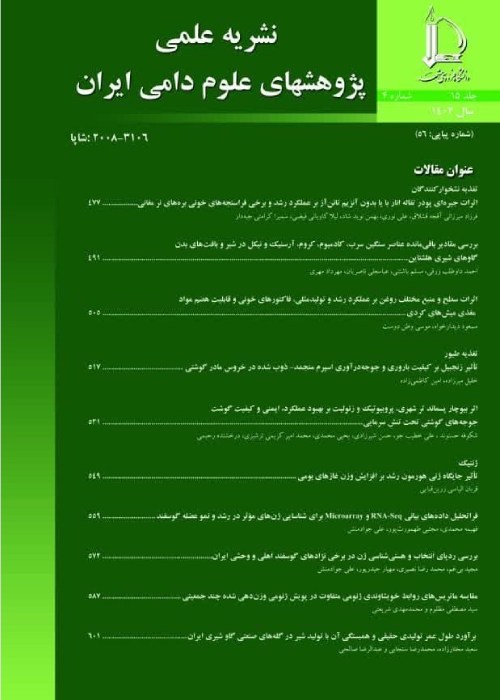Effects of different levels of mustard seed treated with FeS04-7H2O on performance and blood metabolites of Japanese quails
Author(s):
Abstract:
Introduction
In comparison with rapeseed (canola), mustard has agronomic advantages such as drought tolerance and disease resistance, which empower this crop with a considerable oil production potential. Mustard contains toxic substances e.g. glucosinolate, erucic acid, sinapine and tannin. The substances induce unpalatability, growth retardation, low feed efficiency, thyroid gland enlargement and reproductive problems, particularly when the seed is incorporated in the diet at high levels (19, 26). The FeSO4 treatment of mustard meal is an effective method of detoxification of the meal for using in poultry diets. It can reduce the oxazolidinethione content of the meal by about 88% and the isothiocyanate content by 74% (8).As mustard seeds are available at a lower price than canola seed, in some regions of Iran, this study was conducted to investigate the effects of different dietary levels of wild black mustard seeds treated with FeSO4 on growth performance, blood metabolites, carcass characteristics and meat quality of Japanese quails.Materials And Methods
Two-hundred Japanese quails of age seven-day old were randomly assigned to 4 treatment groups with 15 birds in each one of them. The experiment consists of 4 replicates in a completely randomized design. Mustard seeds were treated with FeS04-7H2O according to Daghir and Nawazish (8) procedure. Experimental treatments consisted of control diet (without mustard seed) and diets contained treated mustard seed at 5, 10 and 15% levels. The experimental period lasted up to the age of 35 days. The rearing and management conditions were the same for all groups. Experimental diets were formulated to meet the nutrients requirements of the Japanese quails (20). Chicks had free access to feed and water during the experimental period. Live body weight and feed intake were recorded weekly.On days 35 of the experimental period, blood samples of one male bird per cage (four birds per treatment) were collected to determine the blood metabolites. After slaughtering, breast muscle was separated and kept frozen at -18°C for 30 days. Breast muscle lipid peroxidation was assessed as thiobarbituric acid-reactive substance concentrations in samples by the method of Tarladgis et al. (27). The breast muscles samples were also used for pH (16), water holding capacity, drip loss (7) and cooking loss (4) tests.Results And Discussion
Percentage of crude protein, ether extract, ash, moisture, and AMEn (Kcal/Kg) of the experimental mustard seed were 28.6, 40.3, 5, 7, 14.8 and 4630, respectively. Using different levels of processed mustard seed had no significant effects on growth performance compared to the control. Using untreated mustard seed (10) and mustard meal (6, 21) at more than 10 percent had detrimental effects on performance. However, it seems that using 15% treated mustard had no adverse effect on growth performance.Relative weights of the carcass traits (thigh, breast, heart, testis, gizzard, cecum and small intestine) were not significantly affected by the treatments. However, the weight of pancreas tended to be heavier in the birds fed mustard seed (PKeywords:
Language:
Persian
Published:
Iranian Journal of Animal Science Reaserch, Volume:7 Issue: 2, 2015
Pages:
153 to 161
magiran.com/p1475549
دانلود و مطالعه متن این مقاله با یکی از روشهای زیر امکان پذیر است:
اشتراک شخصی
با عضویت و پرداخت آنلاین حق اشتراک یکساله به مبلغ 1,390,000ريال میتوانید 70 عنوان مطلب دانلود کنید!
اشتراک سازمانی
به کتابخانه دانشگاه یا محل کار خود پیشنهاد کنید تا اشتراک سازمانی این پایگاه را برای دسترسی نامحدود همه کاربران به متن مطالب تهیه نمایند!
توجه!
- حق عضویت دریافتی صرف حمایت از نشریات عضو و نگهداری، تکمیل و توسعه مگیران میشود.
- پرداخت حق اشتراک و دانلود مقالات اجازه بازنشر آن در سایر رسانههای چاپی و دیجیتال را به کاربر نمیدهد.
In order to view content subscription is required
Personal subscription
Subscribe magiran.com for 70 € euros via PayPal and download 70 articles during a year.
Organization subscription
Please contact us to subscribe your university or library for unlimited access!


